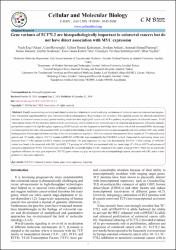| dc.contributor.author | Küçük, Nazlı Ezgi Özkan | |
| dc.contributor.author | Horozoğlu, Cem | |
| dc.contributor.author | Timirci Kahraman, Özlem | |
| dc.contributor.author | Arıkan, Soykan | |
| dc.contributor.author | Farooqi, Ammad Ahmad | |
| dc.contributor.author | Sürmen, Saime | |
| dc.contributor.author | Korkmaz, Gurbet | |
| dc.contributor.author | Kelten Talu, Esra Canan | |
| dc.contributor.author | Sabitaliyevich, Uteuliyev Yerzhan | |
| dc.contributor.author | Yaylım, İlhan | |
| dc.date.accessioned | 2020-05-15T23:36:10Z | |
| dc.date.available | 2020-05-15T23:36:10Z | |
| dc.date.issued | 2019 | en_US |
| dc.identifier.issn | 0145-5680 | |
| dc.identifier.issn | 1165-158X | |
| dc.identifier.uri | https://hdl.handle.net/11363/2135 | |
| dc.description.abstract | Rapidly accumulating preclinical and clinical studies have helped us to unveil underlying mechanisms of colorectal cancer development and progression. Deregulated signaling pathways play instrumental role in carcinogenesis, drug resistance and metastasis. Wnt signaling cascade has attracted considerable attention in colorectal cancer as many ground-breaking researches have highlighted central role of Wnt pathway in pathogenesis of colorectal cancer. T-Cell Transcription Factors (TCFs) have been shown to work synchronously with beta-catenin to fuel colorectal cancer development and progression. Chromatin immunoprecipitation coupled with high-throughput sequencing (ChIP-Seq) data sets has deepened our knowledge about critical role of risk-associated SNPs. Increasingly it is being reported that many risk-associated SNPs are located within binding sites for transcription factors and consequently risk status of these SNPs may modify binding pattern of transcriptional factors and thus rewire the transcriptional regulation. DNA was extracted from peripheral blood samples of 117 colorectal cancer patients and 127 healthy subjects. TCF7L2 variants (rs6983267, rs7903146) were examined by the PCR-RFLP method. Tumor and the surrounding tissues were dissected from 37 CRC patients and RNA isolation was performed. The gene expression of c-myc was determined by RT-PCR. T allele carriage of rs6983267 variant was found to be associated with CRC (p=0.042). TT genotype of rs7903146 was associated with late tumor stage (T3+T4) (p=0.037) and presence of mucinous component (p-0.031). 'MT haplotype was found to be statistically higher in CRC compared to the control group (p-0.007). Mere was no statistically significant difference in c-myc gene expression. TCF7L2 gene variants may play an important role in histopathologic aspects associated with CRC and it is independent of c-myc gene expression. | en_US |
| dc.description.sponsorship | The present work was supported by the (Project No. 32513) Bilimsel Arastirma Projeleri Birimi, Istanbul Universitesi [32513]. | en_US |
| dc.language.iso | eng | en_US |
| dc.publisher | C M B ASSOC, 34 BOULEVARD SOLFERINO, 86000 POITIERS, FRANCE | en_US |
| dc.relation.isversionof | 10.14715/cmb/2019.65.8.1 | en_US |
| dc.rights | info:eu-repo/semantics/openAccess | en_US |
| dc.rights | Attribution-NonCommercial-NoDerivs 3.0 United States | * |
| dc.rights.uri | http://creativecommons.org/licenses/by-nc-nd/3.0/us/ | * |
| dc.subject | TCF7L2 | en_US |
| dc.subject | Colorectal Cancers | en_US |
| dc.subject | Tumor stage | en_US |
| dc.subject | Gene expression | en_US |
| dc.subject | Signaling | en_US |
| dc.subject | 8Q24 | en_US |
| dc.subject | TRANSCRIPTION | en_US |
| dc.subject | RS6983267 | en_US |
| dc.subject | PROGRESSION | en_US |
| dc.subject | RISK | en_US |
| dc.title | Gene variants of TCF7L2 are histopathologically important in colorectal cancers but do not have direct association with MYC expression | en_US |
| dc.type | article | en_US |
| dc.relation.ispartof | CELLULAR AND MOLECULAR BIOLOGY | en_US |
| dc.department | Sağlık Hizmetleri Meslek Yüksekokulu | en_US |
| dc.identifier.volume | 65 | en_US |
| dc.identifier.issue | 8 | en_US |
| dc.identifier.startpage | 1 | en_US |
| dc.identifier.endpage | 6 | en_US |
| dc.relation.publicationcategory | Makale - Uluslararası Hakemli Dergi - Kurum Öğretim Elemanı | en_US |



















